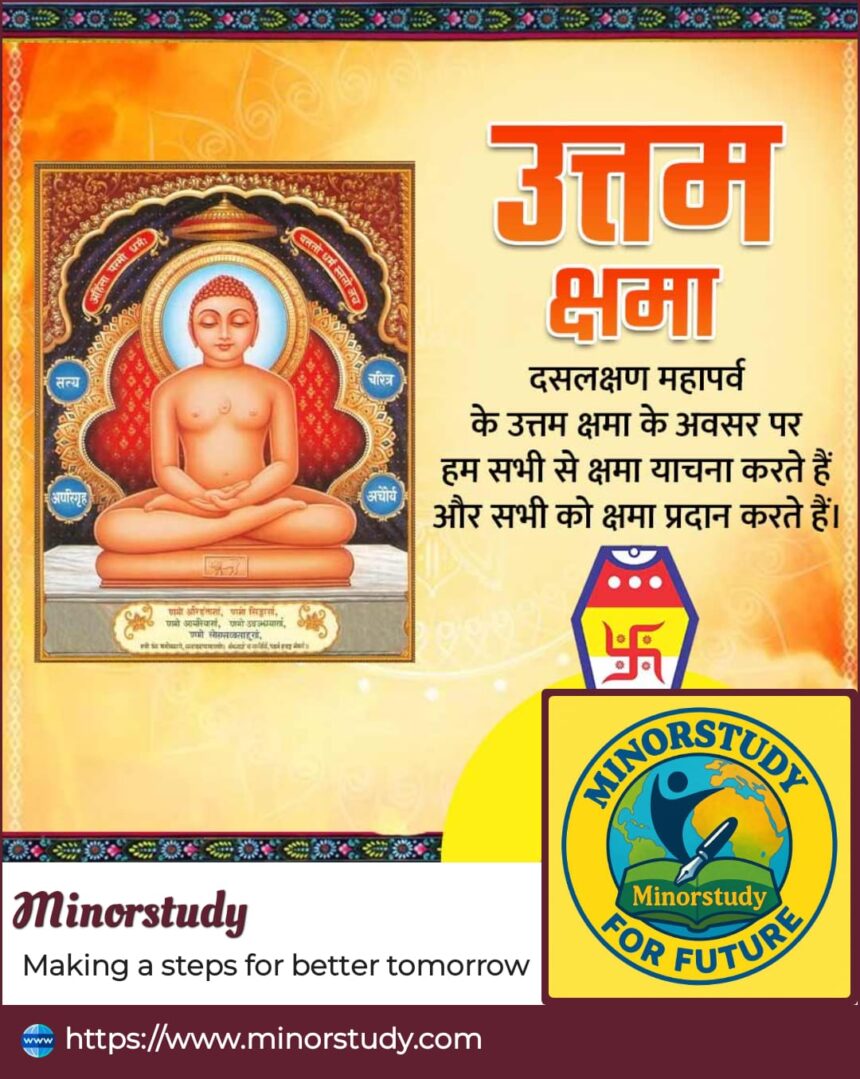🌟 Introduction
Forgiveness is one of the greatest virtues of human life. Every religion, philosophy, and culture emphasizes the importance of letting go of anger and embracing peace. In Jainism, forgiveness takes a supreme position and is observed as Uttama Kṣamā, one of the Ten Virtues (Dashalakshana Dharma).
- 🌟 Introduction
- 🌿 What is Uttama Kṣamā?
- 🏛️ History of Uttama Kṣamā in Jainism
- 📜 Timeline of Forgiveness in Jain Tradition
- ✅ Significance of Uttama Kṣamā
- 🪔 Observance of Uttama Kṣamā
- 🌍 Daily Life Impacts of Uttama Kṣamā
- 📊 Interesting Facts About Uttama Kṣamā
- 💌 Wishing Messages for Uttama Kṣamā
- 📌 Important Points
- ❓ FAQs
- 🏆 Importance of Uttama Kṣamā in Society
- 📝 Conclusion
Uttama Kṣamā means Supreme Forgiveness—the ability to forgive oneself and others, to seek forgiveness for mistakes, and to rise above anger, hatred, and revenge. It is not just an act, but a spiritual discipline that transforms individuals, families, and society.
In this article, we will explore everything about Uttama Kṣamā—its history, facts, timeline, significance, observance, wishing messages, daily life impacts, FAQs, and importance to society. By the end, you’ll understand why Jain philosophy calls forgiveness the gateway to peace, purity, and liberation.
🌿 What is Uttama Kṣamā?
The word Kṣamā comes from the Sanskrit root “Ksham”, meaning to forgive, to tolerate, to bear with patience.
Uttama = Supreme, Highest.
Kṣamā = Forgiveness, tolerance.
Thus, Uttama Kṣamā means the Supreme Forgiveness—a state of mind where one neither harbors anger nor seeks revenge, but instead forgives and lets go of all grudges.
In Jainism, Uttama Kṣamā is not seen as weakness, but as the highest strength of the soul. It is practiced during:
Paryushana and Das Lakshana Parva (Jain festivals of self-purification).
Kshamavani Day (Forgiveness Day), when Jains seek forgiveness from everyone with the words “Micchami Dukkadam” (“If I have hurt you knowingly or unknowingly, I seek your forgiveness”).
🏛️ History of Uttama Kṣamā in Jainism
Scriptural Foundations
Jain Agamas (scriptures) describe Kṣamā as a paramount virtue for attaining liberation (moksha).
Forgiveness cleanses the soul from anger (krodha), one of the four major passions (kashayas) that bind karmas.
Teachings of Jain Tirthankaras
Lord Mahavira, the 24th Tirthankara, strongly emphasized forgiveness and non-violence.
His principle, “Ahimsa Parmo Dharma” (Non-violence is the supreme religion), includes forgiveness as its essence.
Historical Observances
From ancient times, Jains have celebrated Paryushana/Dashalakshana Parva, during which forgiveness rituals form the central practice.
The tradition of Kshamavani Day evolved to encourage universal reconciliation.
Modern Relevance
Today, Uttama Kṣamā is recognized beyond Jainism, inspiring movements for peace, conflict resolution, and stress-free living.
📜 Timeline of Forgiveness in Jain Tradition
6th Century BCE: Lord Mahavira spreads teachings of forgiveness as key to liberation.
Early Jain Scriptures: Forgiveness documented as one of the Ten Virtues (Dashalakshana Dharma).
Medieval Period: Jain scholars emphasize forgiveness through literature, poetry, and rituals.
19th–20th Century: Jain communities institutionalize Kshamavani Day during Paryushana.
21st Century: Forgiveness is globally recognized as a psychological and spiritual therapy, with Jain principles influencing peace movements.
✅ Significance of Uttama Kṣamā
Spiritual Purification – Removes karmic bondage caused by anger.
Mental Peace – Releases stress and brings inner calm.
Social Harmony – Encourages reconciliation, reduces conflicts.
Strength of Character – Shows courage in forgiving, not weakness.
Gateway to Liberation – Essential step in Jain path of moksha.
Universal Value – Forgiveness is not limited to Jains; it applies to all humanity.
Balance in Relationships – Restores love and respect in families and communities.
Self-Healing – Helps overcome guilt and self-blame.
Non-Violence in Action – Forgiveness embodies the highest form of Ahimsa.
🪔 Observance of Uttama Kṣamā
During Das Lakshana Dharma
Forgiveness is the first virtue observed in the ten-day festival after Paryushana.
Devotees engage in prayers, meditation, and reflection on past mistakes.
On Kshamavani Day
People approach family, friends, neighbors, colleagues, and even strangers.
With folded hands, they say: “Micchami Dukkadam”—a universal message of apology and forgiveness.
Personal Practice
Meditation on forgiveness.
Letting go of grudges in daily interactions.
Self-forgiveness for past mistakes.
🌍 Daily Life Impacts of Uttama Kṣamā
Reduces Stress: Letting go of anger improves mental health.
Improves Relationships: Forgiveness heals broken bonds.
Boosts Emotional Strength: Builds tolerance and patience.
Encourages Compassion: Creates a kinder society.
Promotes Equality: Forgiveness removes ego and pride.
Enhances Self-Growth: Encourages humility and mindfulness.
Spreads Positivity: A forgiving person inspires peace in others.
📊 Interesting Facts About Uttama Kṣamā
Forgiveness is the first step of the Ten Jain Virtues (Dashalakshana Dharma).
The famous Jain prayer phrase “Micchami Dukkadam” is recited millions of times worldwide during Paryushana.
Jain monks and nuns practice forgiveness daily, not just annually.
Scientific studies show forgiveness reduces blood pressure, anxiety, and depression.
The United Nations and peace groups often refer to Jain forgiveness practices as models for conflict resolution.
💌 Wishing Messages for Uttama Kṣamā
🌿 “On this Uttama Kṣamā, let us forgive and seek forgiveness with humility. Micchami Dukkadam.”
✨ “Forgiveness is strength, not weakness. May Uttama Kṣamā bring peace and happiness to your heart.”
🌸 “Wishing you inner calm, harmony, and love through the practice of Uttama Kṣamā.”
🌟 “Forgive others as you would want to be forgiven—this is the true essence of Uttama Kṣamā.”
📌 Important Points
Uttama Kṣamā = Supreme Forgiveness.
Part of Dashalakshana Dharma in Jainism.
Observed during Paryushana & Das Lakshana Parva.
Central ritual: “Micchami Dukkadam.”
Forgiveness purifies the soul and reduces karmic bondage.
❓ FAQs
Q1. What is Uttama Kṣamā in simple words?
It means supreme forgiveness—letting go of anger, forgiving others, and seeking forgiveness.
Q2. Why is forgiveness important in Jainism?
Because anger binds negative karma, and forgiveness cleanses the soul.
Q3. What is said on Kshamavani Day?
People say “Micchami Dukkadam” to seek forgiveness for past mistakes.
Q4. Is forgiveness only towards humans?
No, Jains practice forgiveness towards all living beings.
Q5. How can Uttama Kṣamā help in modern life?
It reduces stress, heals relationships, and brings peace in a fast-paced world.
🏆 Importance of Uttama Kṣamā in Society
Reduces Violence: Forgiveness prevents conflicts and promotes peace.
Strengthens Communities: People bond through apology and acceptance.
Builds Trust: Essential for cooperation and harmony.
Global Relevance: Forgiveness is a universal value, beyond religion.
Moral Foundation: Encourages ethical living in families, schools, and workplaces.
📝 Conclusion
Uttama Kṣamā is not just a ritual of Jainism—it is a universal principle of life.
In a world filled with stress, misunderstandings, and conflicts, forgiveness is the medicine that heals. By practicing Uttama Kṣamā, we not only purify our souls but also bring peace to society.
It teaches us:
Forgive others sincerely.
Seek forgiveness humbly.
Forgive yourself with compassion.
So, this year, when you say “Micchami Dukkadam,” let it come from the heart. Because true forgiveness is not about forgetting—it is about remembering without anger.
Let us embrace Uttama Kṣamā as a daily habit, not just a festival observance, and make forgiveness the foundation of a peaceful and happy world. 🌿









I think other web-site proprietors should take this web site as an model, very clean and wonderful user friendly style and design, let alone the content. You are an expert in this topic!